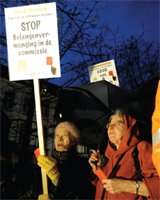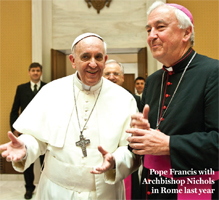Archbishop Vincent Nichols knows he will have to ‘learn the ropes’ after getting a red hat today. He talks to Catherine Pepinster about some of the issues that will be close to his heart
The days of waiting are over. This weekend, Vincent Nichols is due to become a cardinal, a prince of the Church, in a ceremony in St Peter’s, Rome, conducted by the Pope and attended by members of the College of Cardinals and guests from around the world.
It will be the culmination of a career in the Church which began as a parish priest in his home diocese of Liverpool, followed by appointment as an auxiliary bishop in Westminster, then Archbishop of Birmingham, followed by a return to Westminster as its archbishop. Unlike previous holders of that post – Hume, Heenan, Vaughan among them – he has not had his red hat bestowed quickly, for they succeeded to the Westminster see upon the death of the previous holder of office and gained the red hat soon afterwards.
Archbishop Nichols had to wait; his Westminster predecessor, Cormac Murphy-O’Connor, retired as archbishop in 2009 but didn’t turn 80 until August 2012. Only then was Nichols deemed eligible for the highest office of the Church.
That is not the only unusual aspect to his appointment to the College of Cardinals. It comes as the Church enters a new era under Pope Francis – an era in which simplicity and humility are all. Francis made his views known about the events surrounding the consistory this weekend, when 68-year-old Nichols and 18 others will join the college, in a letter to those chosen, urging them to keep the celebrations simple (he might have had in mind the 1,000 supporters who travelled to Rome to see New York Cardinal Timothy Dolan get the red hat at the 2012 consistory).
Such expectations notwithstanding, there are plenty of celebrations in Rome for Cardinal-designate Nichols: first a dinner on Thursday, hosted by Nigel Baker, British ambassador to the Holy See; lunch and an evening reception on Sunday night at the English College; dinner at the Beda, the other English seminary, on Monday. There will be day-long meetings held on the family involving the Pope and the College of Cardinals, together with “the new boys”, as Nichols describes the candidates for the red hat, and Masses at Cardinal Cormac’s titular church, Santa Maria sopra Minerva, at St Peter’s and at St Paul’s Outside the Walls.
There will be the simple ceremony on Saturday when he becomes Cardinal Nichols and then perhaps the most extraordinary event of all: the visite di calore on Saturday afternoon when thousands of people queue to greet the new cardinals in rooms in the apostolic palace, with all of “the new boys” dressed in scarlet. It is then, above all, that you really do get a sense that these are the princes of the Church.
But how does that sit with Pope Francis’ urging of simplicity? How will Cardinal Nichols live? He seems rather taken aback by the idea of a new, grander life. “My life is not much different now to when I was a young priest,” he says. “I do the washing up.” But he knows that people will honour him because of his new post, and he says he accepts that.
While its purpose, he says, is mostly about giving the Pope support and advice – and, of course, voting for his successor in the next conclave – he also seems ready to relish what else it will involve. One can sense that he is raring to go as a champion of people who have few others to speak up for them. “Pope Francis has chosen as new cardinals people whose lived experience is poverty and are from the biggest cities around the world – Rio, Santiago, London. This explains his priorities and his intentions.”
It explains, perhaps, the new cardinal’s intentions too. In recent years, since the publication of Benedict XVI’s erudite encyclical, Caritas in Veritate, on the economy and the need for virtue, Vincent Nichols has put a great deal of energy into talking to business people about ethics. Some Catholics complained at the time that he was more interested in the wealthy end of society than those at the bottom of the pile. They could not say that now.
After consistently supporting Caritas, the social action arm of the Church, Nichols has, step by step, been speaking about poverty and the need for Catholics to express their solidarity with the poor – through organisations providing breakfast for schoolchildren and organising tea parties for lonely older people.
Now he’s gone much further and has been speaking out, firstly about restrictions on bringing in foreign spouses of British citizens, and criticising the impact of welfare reform. It brought a direct response from the Prime Minister himself.
Perhaps after five years or so of being the quiet, polite archbishop, something of the Liverpool bruiser is emerging, the man from the Anfield terraces who is shouting for his team – the people who are suffering. And in doing so, it’s clear he’s ready to take on the politicians, attacking government welfare reforms and some of their consequences as “a disgrace”. In an interview with The Daily Telegraph earlier this week, he complained that the welfare safety net “no longer exists and that is a real, dramatic crisis”.
It was apparent during his interviews with the press on Tuesday, before he left for Rome, that he is more than willing to speak his mind and that he is using the Catholic network – its parish priests, its schools, its charities – to learn what life is like for ordinary people. He is hearing that some are desperate, running out of money and having to turn to foodbanks. He is also concerned about migrants, who often feel victimised.
“It’s clear that in London people who are coming in to make sure the city carries on working are the immigrant community. If you use the NHS, the fact that it works is down to migrants. The idea that they are a net drain on our resources is false. We should not have a discourse built on fear,” he says.
The cardinal-designate is clear that the Christian response is not just to help people such as the poor but to understand the causes of poverty. “It is part of my responsibility to not only encourage people to help through food banks, but to listen. These are difficult issues and when people are caught in destitution there are multiple reasons.”
He sees this as part of the Christian vocation of witness and discipleship – something Pope Francis has been advocating since his election. This is where Francis has made most impact, says Nichols, more than through any reforms of the Curia he is planning or formation of his council of eight cardinal advisers.
“The most significant thing is the personal witness that he gives. At the heart of it is his understanding that we are all missionary disciples. Discipleship is being called to the company of the Lord and trying to live each day in the presence of the Lord.”
Pope Francis’ ministry, Nichols believes, has shifted perceptions of the Catholic Church, and he agrees that it had become a tainted brand, much of it to do with the abuse scandals. “I see it in London. In certain circles, it was fashionable to be almost proud of the fact you were a lapsed Catholic. Now people say ‘I’m a Catholic’ with a little bit of pride.”
An estimated 849,200 people in England and Wales attend Mass weekly, according to figures compiled by the Pastoral Research Centre Trust for 2012, a drop of nearly 14 per cent in a decade, although anecdotal evidence suggests a rise in Massgoing due to the Francis effect. It puts the Catholic Church alongside the Church of England in weekly church attendance. Its head, the Queen, has said that Christianity is woven into the fabric of society – in marked contrast to faith minister Baroness Warsi who says that aggressive secularism is being imposed by stealth. Who does Cardinal-designate Nichols think is right?
He hesitates, then says: “My perception is nearer to Her Majesty’s. What Pope Benedict made clear is his expectation that a modern, complex society would have secular institutions. He did not want institutions that are corrosive of faith. Some people see society as better for the Christian faith’s presence, others say it is an infantile myth. We are more prepared as a society to have a more rounded conversation about this.”
As to rounded discussions, Catholics in Britain had been hoping to have one about the questionnaire on marriage and the family which the laity were asked to fill in as part of preparations for the Synod on the Family in October. The bishops of Germany, Switzerland and the Netherlands have released reports on the findings, indicating disenchantment with official teaching on contraception, divorce and homosexuality, so why could the bishops of England and Wales not do the same?
Nichols defends the decision: “We were asked by the synod not to give a publicly detailed response, because the room for manoeuvre would be cut down,” he says. “The aim of this was to listen to people’s experience and to see the challenges in this area today.”
However, Cardinal-designate Nichols has decided to at least offer some response to the Catholics of his own diocese of Westminster.
“I want to try to use the questions and responses to form an examination of conscience for all of us. They spell out the challenges. So we will put together a reflection.”
The new cardinal’s time for his diocese will be restricted in the future by his expanding role in Rome, not least due to his membership of the Congregation for Bishops, the body that recommends bishops to the Pope following study of the terna, or reports from the apostolic nuncios around the world.
Its work, says Nichols, “is crucially important”, but the post is onerous, with meetings held every fortnight in Rome. It’s likely that his particular knowledge will be called upon when bishops are chosen for England and Wales, so it will be worth watching to see if those chosen for dioceses requiring urgent appointments such as Brentwood and Liverpool will get a Mark O’Toole kind of bishop – a straight-down-the-middle Catholic just appointed to Plymouth – or a Mark Davies of Shrewsbury type – conservative, traditionalist.
As for the new cardinal himself, what kind will he be? A Hume, moving Catholics from outsiders to insiders through his ease with the Establishment? A Murphy-O’Connor, overcoming early crises over abuse to charm all who meet him? So far, it looks like we’re getting a touch of Manning – champion of the poor – but mixed with a focus on the ethics of the more prosperous too. Vincent Nichols says it will take time to learn the ropes as a cardinal. But it looks as if he has already found his voice and his cause.





 Loading ...
Loading ...
What do you think?
You can post as a subscriber user...
User Comments (1)
What a difference between the vocabulary of Vincent Nichols, and those chosen by the reporter: "... prince of the Church ...";"the culmination of a career ..."; "... gained the red hat ..."; "... the highest office in the church ...".